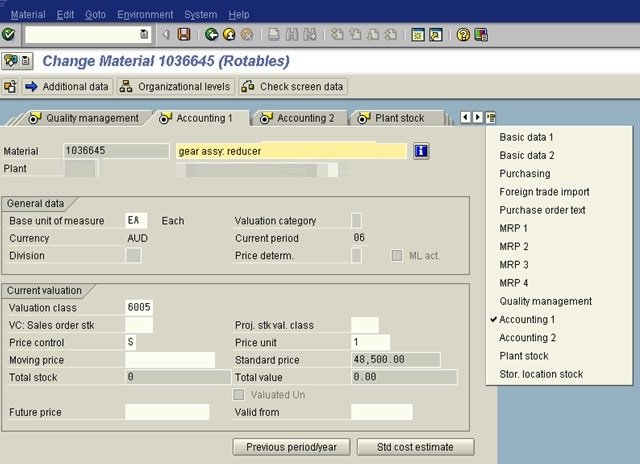ABOUT
Only customize if you don't know how to specialize
When we do the right work, in the right way, for the right reasons, we can achieve Asset Management Systems success stories. Develop high-quality foundation data and make full use of your entire system.
Train your employees, keep training them, and treat them extremely well.
For all of your asset management system questions, CMMS Success can provide your with an unrivalled level of online help.
I will help you understand the future status of your assets, unlock hidden capital, and increase service levels and community satisfaction with best-practice strategic asset management.
With precise, up-to-date reporting and forecasting, you can move from short-term reactive asset fixes to long-term proactive asset planning and meet internal and regulatory obligations.
Anyone with a legitimate asset management question can contact me.
I specialize in providing you with the additional information you require to properly discuss your site's CMMS expenditure requests with key stakeholders in order to obtain much-needed financing and accurately prepare for the future.
Train your employees, keep training them, and treat them extremely well.
For all of your asset management system questions, CMMS Success can provide your with an unrivalled level of online help.
I will help you understand the future status of your assets, unlock hidden capital, and increase service levels and community satisfaction with best-practice strategic asset management.
With precise, up-to-date reporting and forecasting, you can move from short-term reactive asset fixes to long-term proactive asset planning and meet internal and regulatory obligations.
Anyone with a legitimate asset management question can contact me.
I specialize in providing you with the additional information you require to properly discuss your site's CMMS expenditure requests with key stakeholders in order to obtain much-needed financing and accurately prepare for the future.

System-Centric
Our data is the key and our data needs to drive our decisions. When we are being System-Centric, we are allowing the quality measures and datasets to be a key role in the life cycle of our Assets.
Our data should be determining the assessment and management criteria of your company and the inherent reliability of your operations. Good data decisions will positively impact your product or business.
Our data should be determining the assessment and management criteria of your company and the inherent reliability of your operations. Good data decisions will positively impact your product or business.

Classroom Training
When your employees attend a classroom training session via a suitably qualified instructor, they are better able to focus on what is actually being taught and less about what might be going on in the world elsewhere. Especially when all participants put their phones into a box for each learning period. Compared to when they engage in unsupervised or unassisted e-learning sessions, where you cannot even be sure that person did the training, classroom training sessions are the King.

Focuss on financial basics
In most cases it is more economic to maintain and repair an asset and extend its life as long as possible. Sure, there are environmental risks associated and it's possible that the costs to mitigate the failure risk of a well maintained extended life asset exceeds the asset life cycle replacement cost. Even if you do select to replace an Asset rather than repair it, there's potentially tax implications if you fail to replace 'Like for Like'. Maintenance repairs & Like for Like replacement costs (up to a certain value) are typically expensed when it comes to Tax Time. Whilst Non Like for Like and replacement costs above a certain value are capitalized.
GALLERY
Work Management
Work management is the junction of business and team processes and procedures that helps teams work more efficiently by structuring workflow.
Work Management's goal is to carry out maintenance-related operations in a way that safeguards a company's ability to operate while also striking the correct cost-risk balance for each asset.
The maintenance department must be able to complete approved preventive tasks on time, in full, and according to specifications, and this will be the priority for the most part. However, responding to machinery breakdowns (emergency work) can and will disrupt the best-laid plans, and the overall impact will be determined by how much of what has failed and the business impact of the failures.
Reliability engineers spend a lot of time trying to eliminate the need for emergency and break-in work, and they rely largely on feedback from tradies during these situations. Many hours are also spent attempting to improve the efficiency of work tasks, with the goal of increasing 'Tool Time' and reducing waste (Muda).
There should be no huge backlog to handle if a corporation could engineer their way out of difficult breakdown percentages and have their staff spend nearly all of their time performing strategy-based maintenance with little to no 'Non Tool Time.' The term 'backlog' is a misnomer because if we didn't finish the project last Wednesday, it simply has to be rescheduled, unless of course we've recently developed a time machine.
The rescheduling tasks should be risk assessed and this will determine how far out into the future (the forward log) this task will appear. Rescheduling work is not desirable and we should also be coding the rescheduled jobs by recording why they need to be rescheduled as well as the business impact of rescheduling a task. Reliability engineers would be able to analyse this data, and in some situations, blocking rescheduling of a specific operation might be just as damaging to a company as an equipment failure.
The maintenance department must be able to complete approved preventive tasks on time, in full, and according to specifications, and this will be the priority for the most part. However, responding to machinery breakdowns (emergency work) can and will disrupt the best-laid plans, and the overall impact will be determined by how much of what has failed and the business impact of the failures.
Reliability engineers spend a lot of time trying to eliminate the need for emergency and break-in work, and they rely largely on feedback from tradies during these situations. Many hours are also spent attempting to improve the efficiency of work tasks, with the goal of increasing 'Tool Time' and reducing waste (Muda).
There should be no huge backlog to handle if a corporation could engineer their way out of difficult breakdown percentages and have their staff spend nearly all of their time performing strategy-based maintenance with little to no 'Non Tool Time.' The term 'backlog' is a misnomer because if we didn't finish the project last Wednesday, it simply has to be rescheduled, unless of course we've recently developed a time machine.
The rescheduling tasks should be risk assessed and this will determine how far out into the future (the forward log) this task will appear. Rescheduling work is not desirable and we should also be coding the rescheduled jobs by recording why they need to be rescheduled as well as the business impact of rescheduling a task. Reliability engineers would be able to analyse this data, and in some situations, blocking rescheduling of a specific operation might be just as damaging to a company as an equipment failure.
NEWS

Teamwork
When you are involved with a large data project, such as a system implementation or upgrade, teamwork is the key. These projects need to be managed in a particular fashion and will rely on a collaborative effort from the group. Collaborative Teamwork is how these projects will achieve an array of important goals and complete all tasks on the action plan.
To prevent or minimize project cost over-runs, be effective and efficient, the teamwork concepts need to work. An great team is a group of interdependent individuals who work together towards a common goal.
To prevent or minimize project cost over-runs, be effective and efficient, the teamwork concepts need to work. An great team is a group of interdependent individuals who work together towards a common goal.

A Healthy Workplace
Workplace stress, worry, and burnout are all quite frequent, but they don't have to be. There's no reason why a workplace can't be both financially efficient and friendly to employees. In between those bursts of being busy, your office may be a great location to practise mindfulness and meditation; it only takes a minute.
At work, meditation can help you concentrate, be more compassionate, have more energy, and be more productive. With so many of us spending so much of our time at work, the office may be the most practical and reliable venue to include meditation into our daily routines. Make the best of the situation.
At work, meditation can help you concentrate, be more compassionate, have more energy, and be more productive. With so many of us spending so much of our time at work, the office may be the most practical and reliable venue to include meditation into our daily routines. Make the best of the situation.

Always dream big!
Having your head in the clouds is about giving yourself permission to dream and probably dream big. It's completely fine to allow yourself to dream big but you will initially need to keep at least one part of one foot on the ground, just to make sure you stay partially grounded and relatable.
Give your big dreams the ultimate compliment and put them down on paper and thoroughly thrash them out, develop detailed actions and do all that you can to move forward with your goals. It doesn't matter that you are worried about things not turning out the way you dreamed, the main thing is, you are actively living your dreams and that's awesome.
Give your big dreams the ultimate compliment and put them down on paper and thoroughly thrash them out, develop detailed actions and do all that you can to move forward with your goals. It doesn't matter that you are worried about things not turning out the way you dreamed, the main thing is, you are actively living your dreams and that's awesome.
My Other Websites














